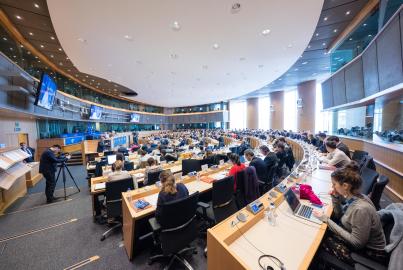The beginning of the end for the gender pay gap
![Gender pay gap [nid:111113]](https://www.eppgroup.eu/sites/default/files/styles/crop_838x582/public/photo/2021/03/gettyimages-1067616000.jpg?itok=j4Des-5u)
Imagine you're Anna, a dedicated and hardworking engineer passionate about your job. You've spent years honing your skills and have contributed significantly to your company's success. But one day you discover that your male colleagues, who have the same qualifications and experience as you, earn considerably more. How would you feel?
This isn't just a hypothetical scenario; it's the reality for many women like Anna across the European Union. In 2021, the gender pay gap in the EU was 12.7%, meaning women earned, on average, 12.7% less than men in the same roles. That means a loss, for women, of thousands of Euros. For example, if you have a salary of €50,000, this pay gap deprives you of €6,350.
This disparity affects women’s financial well-being and takes a significant emotional toll. Discrimination, and this is what the gender pay gap is, is disheartening and demoralising.
These measures offer hope for a future free of the emotional weight and financial penalties of pay discrimination.
Fortunately, the EU has addressed this urgent issue, with recently-adopted legislation aiming to reduce the pay gap through a combination of measures. The EPP Group welcomes this legislation. But whilst we are completely committed to reducing and eventually eliminating the pay gap, we also recognise the financial implications for business. This is why we’ve made sure that the final set of measures includes the so-called ‘staircase model’ to help smaller companies adopt the pay transparency measures gradually, one step at a time. Companies with fewer employees will have a longer timeline to comply with the Directive's requirements, allowing them to implement the necessary changes without being disproportionately burdened by administrative or financial strains. The staircase model may seem slow, but by being fair to businesses, it will ensure that the legislation is fully accepted and fully implemented.
But what about Anna? How will the new legislation impact her and countless others facing the same unfair treatment? By introducing pay transparency, job applicants like Anna would have clear information about the salary. It will become obligatory for the company to advertise the proposed salary when advertising the job, which makes it easier to prevent pay disparities from occurring in the first place. Furthermore, the European Institute for Gender Equality will help develop guidelines for assessing equal work and work of equal value, ensuring that all employees are fairly compensated. Armed with information and able to see the guidelines for herself, Anna can finally challenge the discrimination she has been experiencing and win.
For Anna and millions of other women in the workplace, these measures offer hope for a future free of the emotional weight and financial penalties of pay discrimination. This future may take a little time to get here and the fight is not over, but at last we can say to Anna that the foundation for positive change has been laid.
Note to editors
The EPP Group is the largest political group in the European Parliament with 176 Members from all EU Member States
MEP Contacts


Press contacts

Press officer for Petitions, Gender Equality, Civil Liberties, Justice, Home Affairs and for Lithuania
Other related content
6 / 54

![Gender pay gap [nid:111113]](https://www.eppgroup.eu/sites/default/files/styles/teaser_blue/public/photo/2021/03/gettyimages-1067616000.jpg?itok=j6NJT0Wk)




